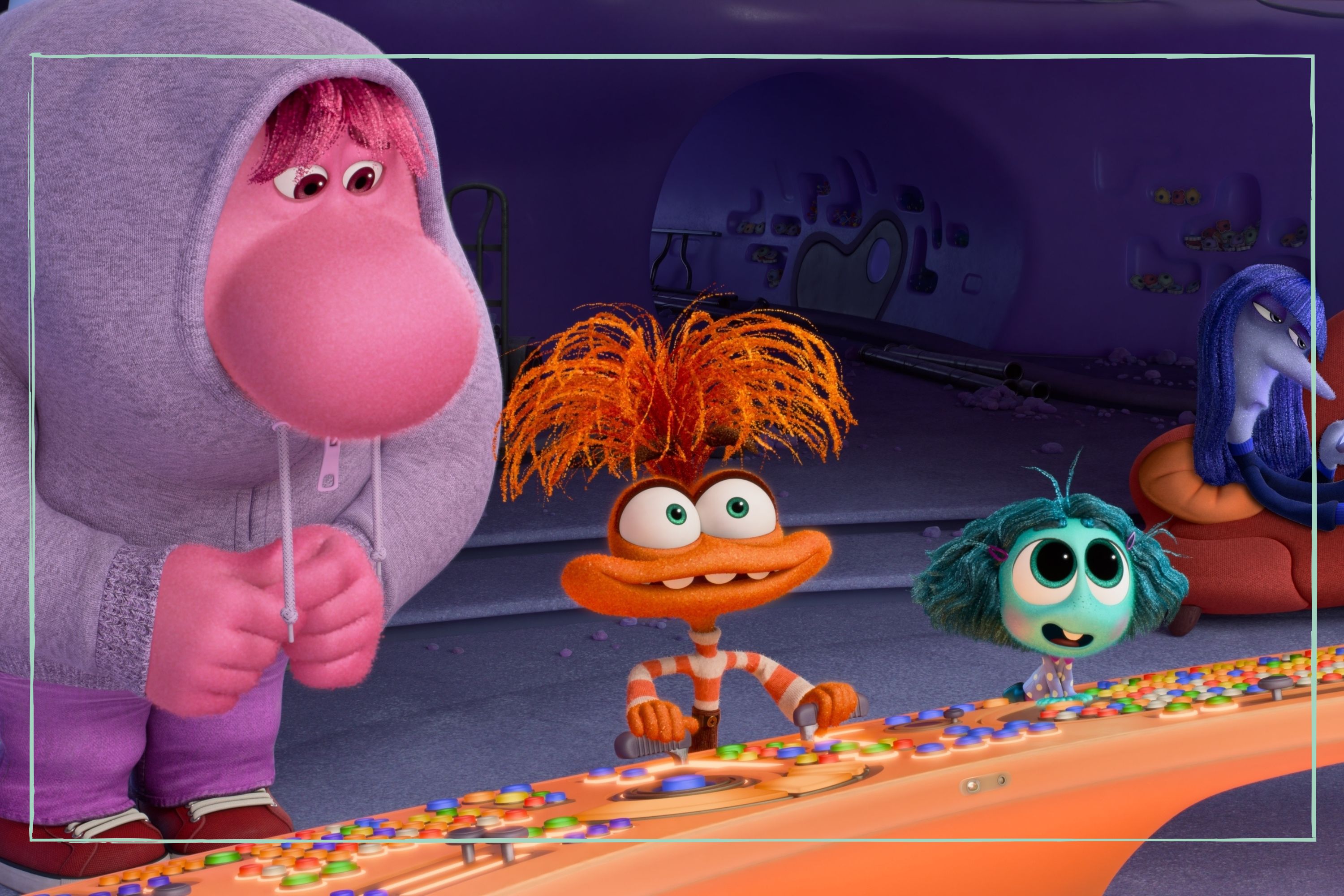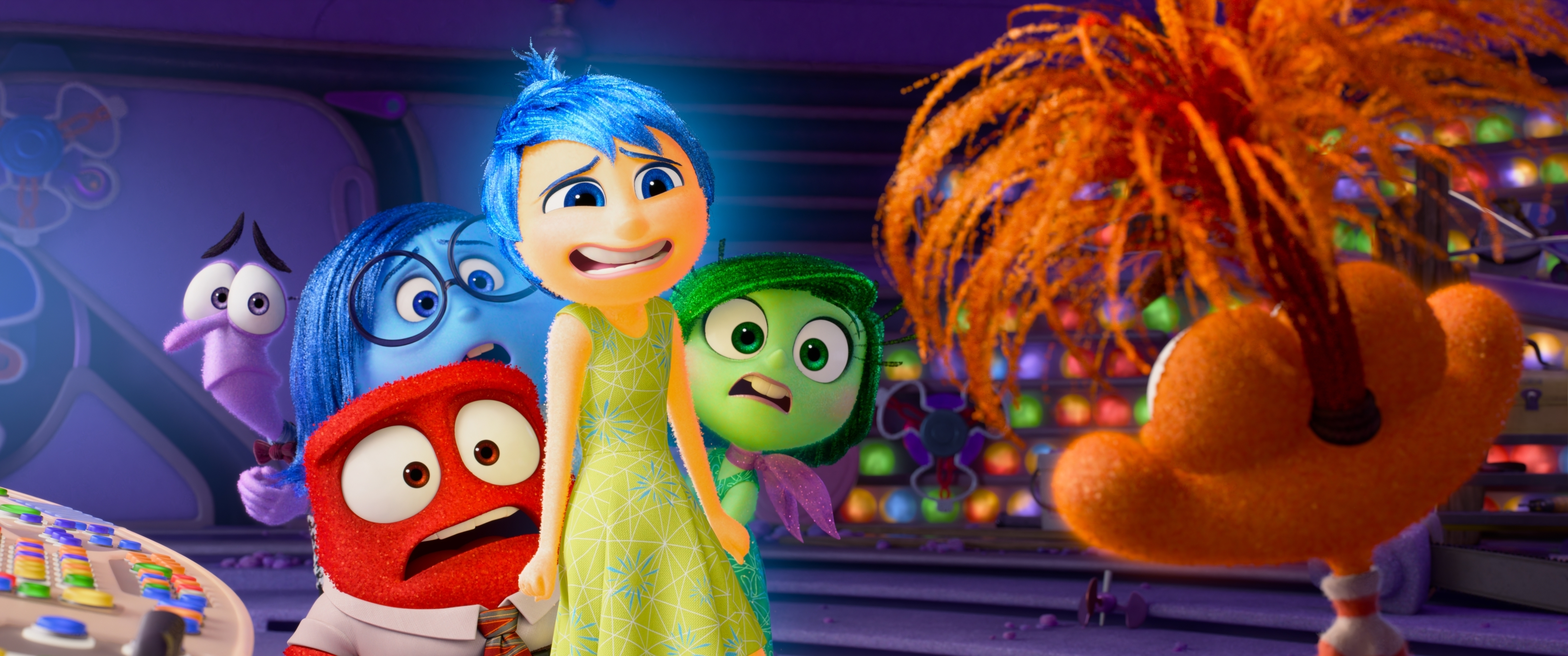
Inside Out 2 is here, and we share expert opinion on the conversations the second instalment of the franchise can open up for tweens and teens.
Hitting cinemas on June 14, Inside Out 2 introduces an all-new character. It's been nine years the first film was released, and main character Riley has hit her teenage years. Her existing emotions are joined by one all parents of teens can identify with - Anxiety. Voiced by Maya Hawke, Anxiety makes a big entrance complete with six suitcases of emotional baggage. Introducing herself to Joy, Fear, Anger, Disgust and Sadness whom viewers are already familiar with, Anxiety really shakes things up.
The introduction of this new emotion will certainly help parents signs of anxiety in kids and teens, helping open up important conversations in a world where social media affects teenagers' mental health and increasing numbers will not socialise. To understand the impact of the new film on tweens and teens, we spoke to L.J. Jones, a BACP registered counsellor and parenting expert.
L.J tells us "Anxiety is a huge issue for teenagers, and this happens for a multitude of reasons such as increased academic pressure from both teachers and parents, as well as self-comparison to peers who might be thriving. The onset of romantic relationships and sexuality can also cause anxiety in older teens as they are navigating a new and complex concept of the world around them, often without the emotional intelligence and understanding to cope."
Along with L.J, BACP registered counsellor and parenting expert, Jenny Warwick, talk us through why anxiety is such a troublesome emotion as children get older, and how to support tweens and teens through anxiety.
Why anxiety can be a difficult emotion during the teenage years
L.J answers this question by telling us "Friction with parents is also a profound factor, as teenagers naturally begin requiring increased freedom and personal choices - which is often met with disapproval from parents. Disputes within the home and adolescents feeling misunderstood and controlled is one of the most common issues brought to the therapy room in this developmental age group."
She adds "Teens are often juggling various challenges, simultaneously, including friendship issues and online exposure and pressures - such as a distorted self-concept due to chronic fixations with image and materialism, as well as unrealistic beauty expectations through the use of filters."
Jenny shares "Being a teenager can be stressful and anxiety is more likely to become a significant emotion for young people. The hormonal changes of puberty can be rapid and significantly impact their mood and emotions, and can often intensify feelings of anxiety. Moreover, the teenage brain is going through critical development, especially in those areas responsible for emotional regulation and impulse control, so their emotional responses are heightened."

How to support teens through anxiety
- Journaling: L.J suggests supporting your teen to use journaling is especially effective for teens who are less vocal about their difficulties. Journaling before bed is a sound way of processing difficult thoughts and feelings and allows them to self-soothe whilst in this state of reflection.
- Mindfulness and meditation: L.J shares "The 4x4x4 breathing technique is a great way to calm anxious teens. I have personally witnessed improved mental wellness once my clients have practiced this technique at home. Age-appropriate meditations are also available online and are particularly impactful when practiced at bedtime."
- Rationalise thoughts: "I ask many of my teen clients to draw two circles, and fill one with the things they can control, and one with the things they cannot control. This is a profound way of empowering them to release the things they are ruminating about which they can in fact ‘let go of’: a proven Cognitive Behavioural Therapy (CBT) technique used to combat anxiety," L.J tells us.
- Anchoring: L. J adds "Asking your teen to pause and ground themselves by acknowledging five things they can see, hear, and maybe touch and smell. This is proven to distract the mind from the anxious thoughts and bring awareness back into the present, therefore releasing anxiety."
- Open communication: Jenny suggests "Encourage your teen to talk about their feelings and listen without judgment. Create a safe space for them to express themselves.
- Educate on anxiety: "Provide information about what anxiety is and how it affects the body and mind. Help them understand their experiences. - Model healthy behaviour: This one is crucial! Life can be stressful, so show them how you manage your own stress by taking care of yourself and incorporating stress-reducing techniques into your life," Jenny adds.
- Seek professional help: It's never a bad thing to ask for help. Jenny concludes "When necessary, guide them to professional resources such as registered counsellors or therapists. A therapist can provide specialised tools and support for managing anxiety.".
When it hit our screens back in 2015, Inside Out was praised for its ability to teach kids about emotions and mental health in an engaging and accessible way. It gave parents a gateway to how to start a conversation about mental health with your children, and helped them to understand that it’s OK to feel a range of emotions, including sadness or anger.
Goodto Family Editor, Stephanie Lowe, is a big fan of Inside Out for this very reason: “As a mum, I am obsessed with feelings – allowing space for them, teaching that it’s okay and normal to have them, and learning how to regulate them – both mine and my son's.
This movie was the gift that kept on giving in terms of ideas for me on how to navigate my son’s feelings. It’s quite complex for young people to fully understand though, such as how important it is to show your emotions so that other people will know when you need care and attention. I'm looking forward to see which conversations will stem from Inside Out 2."
“This movie was the gift that kept on giving in terms of ideas for me on how to navigate my son’s feelings"
GoodtoKnow Family Editor Stephanie Lowe
How Inside Out used expert research
Director Pete Docter sought advice from emotion consultants to create Inside Out. Scientists from the Paul Ekman Group (PEG) were at the heart of this research, and offered their expert insights to the Inside Out writing team to portray the complex nature of emotions.
Inparticular, they focussed on a new approach to sadness. A blog on the PEG website reads: “ Its central insight: Embrace sadness, let it unfold, engage patiently with a preteen’s emotional struggles. Sadness will clarify what has been lost (childhood) and move the family toward what is to be gained: the foundations of new identities, for children and parents alike.”
In an interview for the Pacific Standard, Emotions Expert Dacher Keltner, who advised director Pete Docter, said having emotions like Joy and Sadness work together was a pivotal part of the movie: “One of the things I really resonated with is that we have a naive view in the West that happiness is all about the positive stuff. But happiness in a meaningful life is really about the full array of emotions, and finding them in the right place.
“I think that is a subtext of the movie: The parents want Riley to just be their happy little girl. And she can't. She has to have this full complement of emotions to develop. I think we all need to remember that. This is a weakness in Western culture and the United States. You need sadness, you need anger, you need fear.”
For more on what to watch, we're loving everything about Geek Girl, and share why you should watch it, and we delve into whether fellow Netflix show 'Eric' is a true story. There's a major character change coming up in Paddington 3 - we reveal which beloved figure will be missing.







